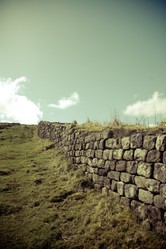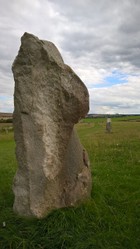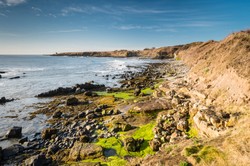I can think of no better place to start than my own name. Beswick is Anglo-Saxon, but -wick is a loan word from Latin, very common in England. Roman forts often had a vicus [pronounced wicus] near them. This was an economic area. When the Romans left the word wicus remained and came to denote an area used for economic purposes, often for sheep or dairy. That wick is a very common place name ending is a sign of the impact of the Roman presence. However, people with wick in their surname are not more likely to be of Roman descent than anyone else in the population.
Furthermore, I live in the district of Stretford, in Greater Manchester, near to Chester Road, and there is Roman influence in these place names. Roman roads were sometimes known as streets. Stretford means Street Ford, where a street, in Latin strada, fords the river Mersey. The street in question is the old Roman road, which runs underneath the long, straight road to Chester. Watling Street is the name of long Roman road which extended from Dover for 276 miles to Wroxeter in the West Midlands
Chester is an English place name ending derived from the Latin castra, military camp. It always denotes a site once occupied by a Roman military unit. Chester, thirty miles from where I live was known as the city of the legions, as it was a legionary base for several hundred years, home of the twentieth legion. Manchester was a mere fort, but its remains have been excavated and can be visited. Variants of the word chester are cester or caster. Examples are Cirencester in Sussex and Lancaster in Lancashire. Furthermore, in South Wales we have the city of Caerleon [ pronounced Carleon. ] This name is composed of the Welsh caer, meaning castle and leon, a word that is a shortened form of legion. City of the Legion, it was the base of the Second Legion. There are Roman remains there, as you will see in the next section. Eboracum is York, home of the sixth legion, and the city is rich in Roman archaeology.
Other place names signify Roman influence. London is a Celtic word, but the Roman name Londinium survived the departure of the Romans, and this is indicative of cultural and ethnic continuity between the Roman period and the subsequent Saxon age. Faversham, in Kent, has a name that includes the Saxon ham [home] with the Latin faber, meaning maker, and is indicative of the survival of a group of smiths from the Roman period into the Saxon age. Nearby, the town of Dover has a name little changed from the Latin Dubris [v and b are phonetically closely related.]





 TheThousand Year Gardenon 11/26/2025
TheThousand Year Gardenon 11/26/2025
 Women of the Gospelson 10/11/2025
Women of the Gospelson 10/11/2025
 Religious Gardenson 08/25/2025
Religious Gardenson 08/25/2025
 Doctor of the Church: John Henry Newmanon 08/03/2025
Doctor of the Church: John Henry Newmanon 08/03/2025




Comments
Canal or aquaduct
Thank you for your comment below, on Jan. 24, 2024, in answer to my previous, previous-day observation and question Jan. 23, 2024.
Your answer about a river-water source 21 boxes down Nov. 21, 2021, in answer to my previous observation and question Nov. 20, 2021, about Caerleon bath-house water intrigues me.
How might all that water have been moved from its source to its Roman use?
The name Beck was used in England before the Norse arrived, so it cannot be the origins of the name. Similarly the Anglo saxons had hot developed many occupational surnames by the seventh century. So I prefer old German has the originating language of the name.
Thank you!
English Wiktionary suggests as Beck etymology German origins in Beck ("brook, stream"); Old West Norse origins in bekkr ("bench"); and spelling variant of Becker ("baker").
Which meaning -- ;-D -- sounds most accurate and agreeable to you?
Beac is akin to the German name Beck, at least that seems to be the best derivation.
Thank you!
English Wiktionary breaks the surname Beswick down as from
-- the Old English personal name Beac;
-- the Old English genitive masculine or neuter possessive singular 's ("of");
-- the Old English wīċ ("bay, camp, encampment, lodging, temporary abode, village").
It gives nothing definition-, etymology- or origin-wise regarding the name Beac.
Might the meaning be lost to posterity or might it have extant actual, possible or probable meanings?
I don't think that there wascan original Latin.Wick was already established in English by the time that Beswick was established, which was probablynin the seventh century. The name Beck fell out of use in the seventh century, so the name cannot be younger than that period.
The second sentence to the first subheading, What's in a name?, considers that "Beswick is Anglo-Saxon, but -wick is a loan word from Latin, very common in England."
What might the original Latin be?
Roman tactics were based on their being a disciplined force fighting an Ill-controlled war band in pitched battle.But from the time of the Gaul Vercingetorix it was known that the Romans were susceptible to guerilla tactics, a deficiency that produced the rout of
Rome at the Teutobergian Forest.The Silures used this weakness to some effect in Wales,but the Picts drove home this advantage in the Caledonian woodland.
The Romans being disciplined and efficient, they were ill-suited for the wild ways of the Picts and Scoti which lacked organised tactics.